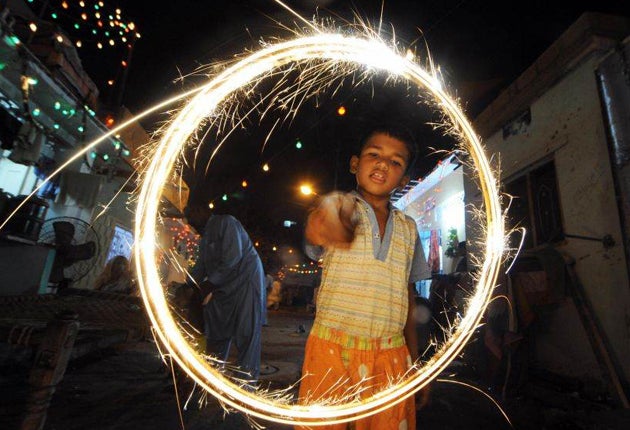Guy Fawkes vs Diwali: Battle of Bonfire Night
As the two festivals coincide, Kevin Rawlinson wonders which fireworks will burn brightest

Your support helps us to tell the story
From reproductive rights to climate change to Big Tech, The Independent is on the ground when the story is developing. Whether it's investigating the financials of Elon Musk's pro-Trump PAC or producing our latest documentary, 'The A Word', which shines a light on the American women fighting for reproductive rights, we know how important it is to parse out the facts from the messaging.
At such a critical moment in US history, we need reporters on the ground. Your donation allows us to keep sending journalists to speak to both sides of the story.
The Independent is trusted by Americans across the entire political spectrum. And unlike many other quality news outlets, we choose not to lock Americans out of our reporting and analysis with paywalls. We believe quality journalism should be available to everyone, paid for by those who can afford it.
Your support makes all the difference.Bonfire Night celebrations are usually the only show in town on 5 November. This year, though, the burning Guys and flaring Roman Candles may have to fight a little harder for the public's attention, thanks to an alternative event which promises similarly spectacular pyrotechnics.
Diwali, the festival of lights, which is marked by fireworks displays and attended by thousands of British Hindus and Sikhs, falls on 5 November this year – the first time since 1972.
The festival, one of the most significant in Hindu culture, is in remembrance of the celebrations which took place when, according to legend, King Rama and his wife Sita returned from exile, and imprisonment, to their kingdom in northern India in the 15th century BC.
The locals were supposedly so happy they set off their own version of fireworks, and each year the festival celebrates this act – with the most notable outside of India being in Leicester. Expect firework displays rivalling even the most enthusiastic of 5 November celebrations.
Neil Saunders, consulting director at data monitoring agency Verdict, predicted a "good boost" in sales of fireworks this year, pointing out that the combination of Diwali falling on the same day as bonfire night – and the fact that they both fall on a Friday – has created "a heightened level of interest in celebrations".
However, Professor Eleanor Nesbitt, a specialist in Religions and Education at Warwick University, said there will also be many private, spiritual celebrations taking place. "A Diwali celebration may look, to the untrained eye, quite similar to a bonfire night. But there are significant differences: there will be no effigy, for example, and there is a religious aspect."
The fact that Britons are so used to fireworks and other pyrotechnics at this time of year has made it easier for Diwali than other Eastern festivals to take hold. "It would be a little more difficult for Indians to go around throwing coloured powder on people for the Holi festival during a British springtime," said Professor Nesbitt.
Bonfires are traditionally constructed with Guys dragged from door-to-door days in advance, but there is no similar public build up to Diwali. The festival can mean different things to the different cultures which celebrate it, but it most commonly takes the form of a five-day festival between mid-October and mid-November.
"Diwali is celebrated on the dark night of this lunar month and thus, is likely to have coincided with bonfire night in the past, although it is unusual for it to do so," said Professor Nesbitt.
"Many Hindus say they are welcoming the Goddess Lakshmi, the Goddess of Wealth and Prosperity. They are praying for their own prosperity in the coming year. Many businesses will also have their account books blessed as part of the festivities."
This year, unlike others, the bonfire night festivities which take place on thousands of parks, sports fields and greens across the country will go head-to-head with Diwali celebrations.
In Leicester, the council is organising a Diwali Day which will "involve a combination of noise and colour". Event organiser Chris Winch said: "It will be an aerial display over the tree tops, so people will be able to see it no matter where they are. There are more fireworks, the budget is bigger today than before and we can have a bigger display."
Additional reporting by Rashmi Kumar
Join our commenting forum
Join thought-provoking conversations, follow other Independent readers and see their replies
Comments